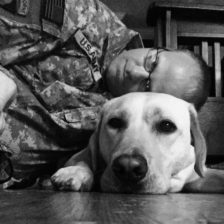Believe it or not, “is that a service dog?” is a question that is often asked when Sam is out with Memphis. Sometimes we hear it when we are at a place like Walmart, or sometimes Sam hears it as he’s out and about for work. There have even been people at work ask him that very question.
What frustrates me is the fact that people try to pass off their pets as a service dog. There, I said it. I have seen people at sporting events with a small, tiny dog (think Chihuahua) and they’ve said “this is my service dog.”
I’m sorry, what?
I’m not sure how that dog can provide a service? Can that dog help its owner if she’s off balance from vertigo or about to fall? Can that dog alert her (and barking doesn’t count, as this dog was doing, repeatedly)…
We’ve had expereinces where Sam has been questioned about Memphis being a “legit” service dog. This does not sit well with me as I tend to get into “Mama Bear” mode.
One example of this was at a SIU Football game. We decided to take the family out for a game, our first game of their season and as we were about to walk in with our tickets it happened.
A young girl (maybe college student) who was scanning tickets in another line walks over to the line we are in and tells that student worker “you need to ask that man for his papers on that dog. We need to see if that is a real dog.”
I’m sorry. A real dog?
Almost at the same time Sam and I both said (politely) “you can’t ask that by law.”
And we got an eye roll and stare back. No “I’m sorry, I didn’t know.” No “oh, okay, my mistake.” An eye roll. And then “well we need to make sure.”
I couldn’t help it. It just came out. “NO, you don’t need to make sure, you need to quit asking.”
According to the Americans with Disabilities Act (ADA), businesses may ask “Is this a Service Dog?” and “What tasks does the Service Animal perform?”
I don’t see anything about a real dog or papers on that card…
(Sam and I both have a card that gives information from the ADA on service animals)
It is hard to keep my cool at times—I will be honest. I don’t want someone questioning my husband in an accusatory tone, or telling him he can’t have a service dog, or that he needs to show proof that the dog is real (of course the dog is real, hello! We didn’t dress him up!).
Businesses may not:
1. Require special identification for the animal (this means you Fat Patties and Tequilas in Murdale).
2. Ask about the person’s disability (this means people should not say, “what’s wrong with you?”)
3. Charge additional fees because of the animal (still can’t figure out why American Airlines asked how much Memphis weighed when Sam was ready to pay for his checked bag).
4. Refuse admittance, isolate, segregate, or treat this person less favorably than other patrons (thanks for seating us out in no man’s land various restaurants).
I know that some people aren’t aware of what service dogs actually do, or why people need them. But, there are differences between wanting to take your pet places and passing it off as a service dog. That I have a problem with. I do know that some people may need an emotional support animal, or a therapy dog (and those dogs–emotional support & therapy do not get all access like service dogs) …but not all dogs can be service dogs.
Equal access is a big deal for us, especially now that Memphis is in our family. Memphis is specifically trained to do work or perform tasks (like alerting) for the benefit of Sam–meaning yes, he works to help Sam with his PTSD. These tasks are directly related to Sam, and it means that Memphis can assist him, despite people asking for papers or identification.
And guess what…Memphis has identification! He has an ID card that is attached to his vest.
If you are curious about what types of dogs can be service dogs, I encourage you to read the FAQ page on This Able Veteran’s website http://www.thisableveteran.org/our-dogs/faqs/
That link also explains the difference between companion dogs, therapy dogs, and service dogs.
Service dogs are getting more attention. A Veteran of the Air Force who works for a Lowe’s store in Texas is getting some national attention. When this Veteran needed a job, Lowe’s hired him, and his service dog (who also wears a Lowe’s vest). There’s a story circulating on social media and you can also read about it here: Lowe’s Employees.
Seeing these Veterans and their service dogs enjoying work, life, and being comfortable is so important. Making them feel as if they are doing something wrong by having a service dog is not okay.
Service dogs do wonderful work. Please respect that work, their Veteran (or handler). Please try not to ask questions that are inappropriate. There are resources and organizations that work hard to help our Veterans and educate those who may be interested in service dogs.
